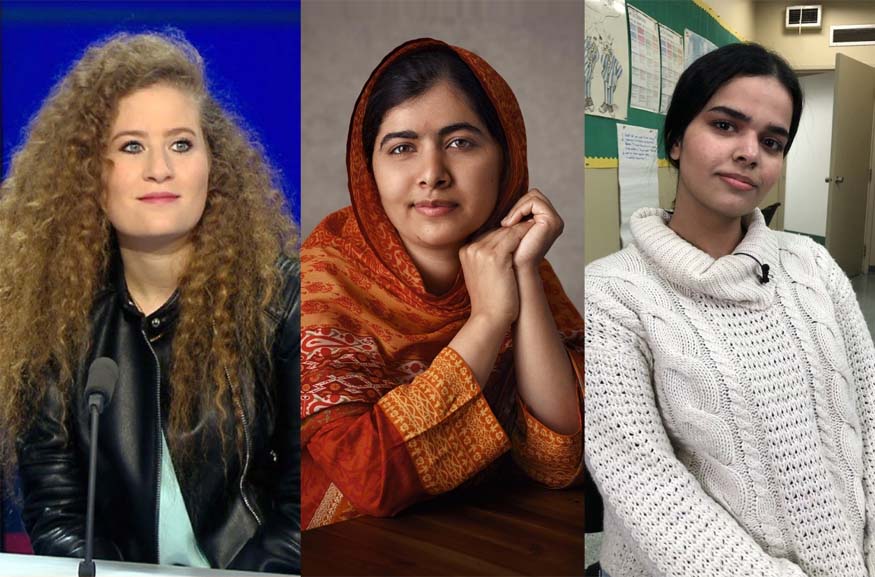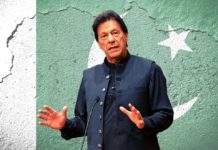New forms of resistance to old systems of oppression; three girl-children of near impossible courage have captured the world’s imagination. Ahed Tamimi, Malala Yousafzai and Rahaf Mohammed are iconic symbols from the West Bank to London and from Toronto to Tokyo. None is celebrated in Pakistan although one is our very own. Why? And what does this say about us?
Tamimi, who turned 18 this month, has fought Israel’s occupation of Palestine since she was 11. At 16 and still tiny, a hard slap on a fully armed Israeli soldier’s face bought her eight months in prison. She spent jail time educating other incarcerated youngsters in legal methods to confront their oppressors. In the Palestinian territories, she is revered. In Israel, she is reviled, the sentence considered too light.
Tamimi knows occupation firsthand. Her father had been beaten into a coma, her brother is still in jail. Her aunt died, pushed down the stairs by a soldier at a military court. Today, large crowds gather to hear her speak against Israel’s theft of land and water. Meanwhile, the authorities hover around, ready to send her back to jail for ‘incitement. Unfazed, she hopes to go to college and someday confront Israel in international courts.
In a Jew-hating country like Pakistan that’s heavy in rhetoric against the ‘Zionist entity’, is Tamimi a heroic figure? Not so! Urdu columnists have barely mentioned her. Just a thin sliver of English-adept liberals recognise her name, as they do Rachel Corrie’s. But they too are ambivalent. A student recently wrote to me that Tamimi’s strain of activism was “self-serving and superficial”.
These young women must be celebrated for what they did and not judged by how the West sees them.
Good girls are supposed to be obedient and passive, so this doesn’t surprise. Female activism — even for the right cause — is deplored by entren-ched patriarchies. Who knows when some tiny wisp of a girl might turn upon you? Tamimi’s father recounts with amusement that when Turkey’s Tayyip Erdogan told her he stood with the Palestinians, she duly thanked him and then asked why she had to have a visa for Turkey when Israelis don’t. Erdogan’s face went red.
I sometimes wonder if our coldness to the photogenic Tamimi comes from her blue eyes, light skin and flowing golden curls. Does the Pakistani identification mechanism get upset if a Muslim girl is blonde? Does blondness put her on the side of the West? Or is our reticence because she flatly refuses to wear a headscarf, although her mother does?
Malala Yousafzai does cover her head but remains unpopular. She’s no militant feminist and her message is boringly monotonous — the right of girls to education. With thousands of girls’ schools across our cities, many urbanites are not impressed. But in Swat under Taliban occupation it earned her a bullet in the head, one that the Tehreek-i-Taliban Pakistan gladly owned.
As though resenting her survival, many Pakistanis ask: what has Malala done to earn her Nobel Prize except get herself shot and show us in a bad light? The answer is: plenty! With intelligence and conviction she has deftly used the West’s good impulses to further her single goal — education for girls everywhere. Her impact grows as large donors, such as Apple and the Gates Foundation, pour money into the Malala Foundation for schools in Afghanistan, Brazil, India, Nigeria, Pakistan, and Turkey.
That so many Pakistanis should question Malala’s Nobel bespeaks their small-mindedness, poverty of thought, and an unhealthy fixation on the West’s failings and political prejudices. Sure, the West’s humanitarianism is selective — that’s clear as day. Malala received a rapturous welcome in Western capitals and the United Nations. On the other hand, in 2016, the United States denied the ‘terrorist’ Tamimi a visa for her speaking tour, ‘No Child Behind Bars/Living Resistance’. Only the European left celebrates her.
Pakistan’s treatment of Malala has been shabby. Countless conspiracy theorists love to believe that her shooting was faked and she is propped up by powers hostile to Islam. Correspondingly, Arab conspiracy theorists describe Tamimi as an invention of Zionist intelligence and media.
Such stupidities must be set aside. Malala and Tamimi must be judged by what they did, not how the West or anybody else sees them. For different reasons, both properly deserve Nobels. Malala laid bare the barbaric nature of the Taliban who, two years later, went on to massacre Army Public School children in Peshawar. Tamimi fearlessly challenges the age-blind and gender-blind brutality of Palestine’s occupiers.
Rahaf Mohammed, born into the world’s most woman-hating nation, is of an entirely different kind. She fought just for herself, not for others. Her cause was to exercise choice, to live her life the way she wanted to and not be forcibly dictated to. But why denigrate that? Every individual cherishes freedom but just a few dare fight for it.
Life had been tough for this independent-minded girl. After she cut her hair short, she was house-imprisoned for six months. Her mother and brother beat her until she bled. Kept like a camel in a shed, she dreaded being married off one day, perhaps to become some Saudi prince’s third or fourth wife. Instead, she dreamed of a career, freedom to wear what she wanted, freedom to marry who she might choose, and freedom to keep or renounce the religion of her birth.
Now safely in Canada, the teenager’s dramatic escape from her conservative family riveted the world last week. Tweeting desperately for help from a barricaded airport hotel room in Bangkok, she feared being deported back home. What would her influential father, the governor of a Saudi province, have done in the name of family or national honour? Would her fate have been better than that of Jamal Khashoggi?
In conclusion: Tamimi fights settler colonialism, Malala concentrates on empowering the girl child, and Rahaf fled to live the life she wants. Their stories are extraordinary and inspiring. Of course, countless other stories won’t ever make it into the open. But so what? Crucially important is for us to realise that in honouring each of these iconic figures, we honour human dignity and every person’s right to freedom.










Very well taken issue excellently written. There are so many different ways to belittle women’s achievements and strengths. Even among the many who do applaud them, there would be few who would support rebellion for a cause in their own homes.
I don’t know about others but I do have the justification not to heroify these women. These women just happened to born at the right place at the right time (and in Malala’s case, with the right father) and the West is not doing anything out of ordinary by supporting them.
As much as I support the Palestinians cause, Tamimi is just one of thousands of Palestinians who spoke against Israel, albeit with catchy, photogenic, West-compatible looks and a gender to nicely fit into the modern narrative. You can’t blame the Palestinians because they’re desperate. They presented to the (Western) world what it wanted to see: a blonde, blue-eyed, youthful shield maiden. The truth is, she’s just another figure who probably would be a martyr now if it were not for her gender and looks.
In Malala’s case, her contributions were ultimately trivial – after all, what a 15-year-old girl could do except be a symbolic icon. No wonder no other Nobel Prize winner is that young. It’s clear that she was being carefully mentored to become what she is, by her father and/or by the West, the latter is not even that far-fetched.
That’s not the whole story: instead of defeating stereotypes, she actively fueled them. You can’t read an article containing the keywords “Pakistan” and “female education” without seeing lots of hate-filled comments citing Malala’s case and generalizing it for all of Pakistan – or whole Islamic world. Everyday Western people never get to hear of our peaceful villages where girls are educated just like boys, let alone the likes of Beaconhouse and LUMS. Even some Pakistanis who have never been to cities other than the Westernized bubbles of Lahore, Islamabad, and Karachi can fall into that trap: that Pakistan is hostile towards women who want to get an education.
I have no opinion about Rahaf other than that she just saw an opportunity in the form of the West; ever-cuddly to the poor, oppressed, oriental women – a narrative that the West hasn’t changed since it began its colonial expeditions. Also, it’s not intellectually honest to label Saudi Arabia “woman-hating nation” looking from completely different prospective; the West shouldn’t be upset if the East calls it debauched or emasculated in return. (I’m not judging the West, just trying to see what one would, from traditional Eastern cultural lens.)
In short, Malala and Rahaf directly support the age-old colonial narrative: stereotypes and saving brown princesses. The narrative too stubborn to see reality as it is and too stubborn appreciate things from different culture’s angle. As for Tamimi, although she’s not directly supporting colonialism – in fact quite the opposite – I don’t see any reason, as a brown person not born to deify blonde sheild maidens, to treat her any different from other Palestinian teenagers that I see every day in my Facebook newsfeed.
It’s also time for the West to learn that female gender shouldn’t get plus points for showing up: they should have to earn it.
All three are examples of courageous young women fighting for their respective causes..
Hoodbhoy wrote about Pakistan’s insensitivity towards young women fighting for their cause due to being a man-dominated sciety.
I do sympathise with the cause. Although, I find the case of Rahaf disconcerting in that she feels that being able to eat pork and discarding Hijab is some kind of freedom for women — or for any one